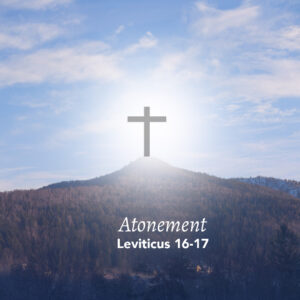Leviticus 16-17: Atonement
February 21, 2024
TODAY'S BIBLE READING:
Leviticus 16-17; Psalm 43; Matthew 19:16-30; Acts 26:19-32

Now at last we come to slightly more familiar territory! The Day of Atonement, the tenth day of the seventh month, a special fast day, where God’s people are to have their sins “atoned,” or paid for, the punishment that they deserve is taken, as God’s holy wrath against an unholy people is propitiated. There are various instructions, summarized far more briefly in Numbers 29:7-11, that show how the priest is to act on this special day. There is also the somewhat mysteriously named “Azazel” goat (16:6-10) (as it is transliterated, literally rendered, from the Hebrew in the ESV version, or as it is traditionally translated “scapegoat,” reflecting the thinking that the word was meaning the goat that was sent away).
But however mysterious or otherwise may be the actual name of the goat, its function is very clear. It takes the sins of the people and dramatically removes them out of the camp, declaring for everyone who can watch that their sins have gone, they have been taken away, they are no more. The Israelites are no more to offer sacrifices to “goat demons,” after whom they are “whoring” (17:7)—apparently idolatrous worship seeping in to the worship of God was a real, ever present danger. But these people, God’s people, are to render their sacrifices to God, trusting his atoning work for their sins, and not giving allegiance to any other so-called “god.”
They are also warned against eating blood (17:10-16), a dietary restriction if not cooked properly perhaps (once again these dietary and cultic matters are perhaps interwoven), but also to reinforce truth. “For the life of the flesh is in the blood, and I have given it for you on the altar to make atonement for your souls” (17:11). Blood sacrifice is intended to teach God’s people a particular lesson, and it is important the special-ness of that lesson is not diluted by more mundane uses—like it would be inappropriate to take your special wedding dress and use it to go and do some gardening or yard work.
Again, we ask what the lesson is for contemporary Christians today. Well, remember how the description of the Day of Atonement begins with a reminder (16:1-2) that there is a holy place into which even the priest may not enter, lest he suffer the same fate as the sons of Aaron, Nadab and Abihu, who offered unauthorized fire before the Lord (Lev. 10:1-3), assuming that anyone could enter his presence without sanctioned or sanctified sacrifice. Ever since the Garden of Eden access to God’s holy place has been barred. There is a curtain between us and God, barred by warrior angels from entering the Garden of Eden again, barred from entering the holy place. God is holy, we are not, and our sin has cut us off from enjoying God’s favor.
But in the atonement of Christ—the atonement to which this day annually pointed and about which it prophesied—there is now a way back to God from the dark paths of sin. And on that day the curtain separating us and God was torn down, from top to bottom (Matt. 27:51), declaring that through Christ and faith in him we may once again enter into his courts with praise and thanksgiving. Leviticus 16 and 17 then teach the follower of Jesus to rejoice that these ceremonies are now fulfilled and that we now have access to God through Jesus!
ABOUT THE AUTHOR
Josh Moody (Ph.D., University of Cambridge) is the senior pastor of College Church in Wheaton, IL., president and founder of God Centered Life Ministries, and author of several books including How the Bible Can Change Your Life and John 1-12 For You.
WANT MORE?
To receive God Centered Life devotionals directly in your inbox, as well as other resources, enter your email address in the form at the bottom of this page and click "subscribe."

